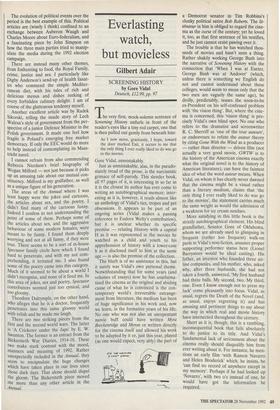Everlasting watch, but movieless
Gilbert Adair
SCREENING HISTORY by Gore Vidal Deutsch, f12.99, pp. 97 The very first, mock-solemn sentence of Screening History unfurls in front of the reader's eyes like a tiny red carpet, one that is then pulled out gently from beneath him:
As I now move, graciously, I hope, toward the door marked Exit, it occurs to me that the only thing I ever really liked to do was go to the movies.
Gore Vidal, unmistakably.
Just as unmistakable, alas, in the pseudo- stately tread of the prose, is the narcissistic grimace of self-parody. This slender book, all 97 pages of it, is interesting in so far as it is the closest its author has ever come to writing an autobiographical memoir; inter- esting as it is, however, it reads almost like an anthology of Vidal's tics, tropes and pet obsessions. It appears to be part of an ongoing series (Vidal makes a passing reference to Eudora Welty's contribution), but it is unclear whether its specific premise — relating History with a capital H as it was represented in the movies he watched as a child and youth to his apprehension of history with a lower-case h as it disclosed itself to him at the same age — is also the premise of the collection.
The blurb is of no assistance in this, but it surely was Vidal's own personal theme. Notwithstanding that for some years (and volumes of essays) now he has anathema- tised the cinema as the original and abiding cause of what he is convinced is the con- temporary world's irreversible estrange- ment from literature, the medium has been of huge significance in his work and, now we learn, in the formative years of his life. No one who was not also an unrepentant movie buff could have written Myra Breckenridge and Myron or written directly for the cinema itself and allowed his work to be adapted by it or, just this year, played (as one would expect, very ably) the part of a Democrat senator in Tim Robbins's clunky political satire Bob Roberts. The lit- terateur in him is obliged to regard the cine- ma as the curse of the century; yet he loved it, too, as that first sentence of his testifies, and he just cannot resist pawing over it.
The trouble is that he has watched thou- sands of movies and hasn't seen a thing. Rather shakily working George Bush into the narrative of Screening History with the connection that 'When I was at Exeter, George Bush was at Andover' (which, unless there is something we English do not and cannot understand about these colleges, would seem to mean only that the two men are vaguely the same age), he drolly, predictably, teases the soon-to-be ex-President on his self-confessed problem with 'the vision thing'. But, where the cine- ma is concerned, this 'vision thing' is pre- cisely Vidal's own blind spot. No one who refers to the dramatist and screenwriter R. C. Sherriff as 'one of the true auteurs', or endeavours to refute the auteur theory by citing Gone With the Wind as a producer — rather than director — driven film (not actually a very good movie, GWTW is to the history of the American cinema exactly what the original novel is to the history of American literature), can have the faintest idea of what the word auteur means. When Vidal, on whom it has clearly never dawned that the cinema might be a visual rather than a literary medium, claims that 'the only thing I ever really liked to do was go to the movies', the statement carries much the same weight as would the admission of a weakness for ice cream sundaes.
More satisfying in this little book is the strictly autobiographical element. His blind grandfather, Senator Gore of Oklahoma, whom we are already used to glimpsing in frequent (rather too frequent) walk-on parts in Vidal's non-fiction, assumes proper supporting performer status here (Lionel Barrymore would be ideal casting). His father, an inventor who founded three air- line companies, and his mother, who, asked why, after three husbands, she had not taken a fourth, answered, 'My first husband had three balls. My second, two. My third, one. Even I know enough not to press my luck' come pleasantly into focus. Vidal, as usual, regrets the Death of the Novel (and, as usual, enjoys regretting it) and has amusing and pertinent things to say about the way in which real and movie history have intersected throughout the century. Short as it is, though, this is a rambling, inconsequential book that fails absolutely to do justice to its title. And Vidal's fundamental lack of seriousness about the cinema really should disqualify him from ever writing about it. For instance, he men- tions an early film 'with Ramon Navarro and Helen Broderick' which, he insists, he `can find no record of anywhere except in my memory'. Perhaps if he had looked up `Novarro', with two o's instead of one, he would have got the information he required.










































































 Previous page
Previous page